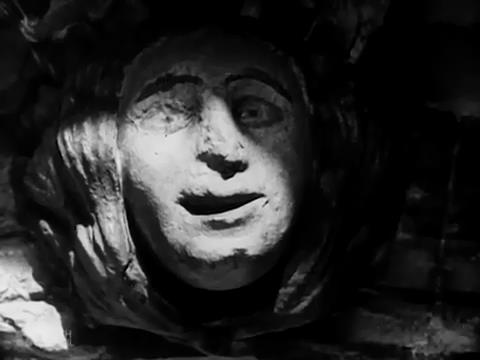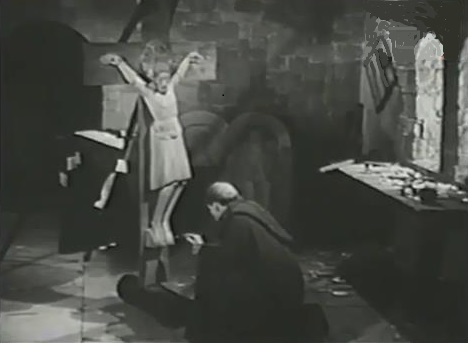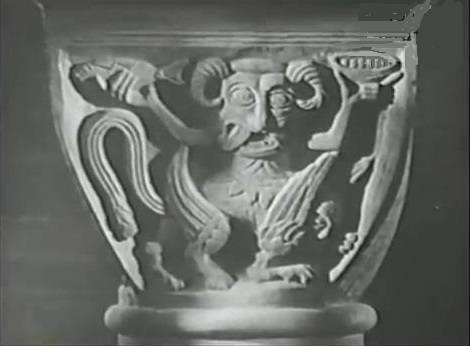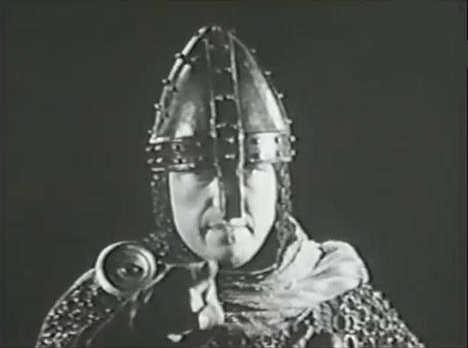Message from Canterbury

Pastoral
landscape with the odd barrage balloon, air raid, sermon. England by the grace of God.
Augustine
and Thomas. A Churchillian intonation, “whatever the enemies of God
and Christ destroy, we shall rebuild again,”
the Rooseveltian “requisites of a natural
order, of a Christian social order.”
Cf.
Powell & Pressburger’s A
Canterbury Tale.
Purcell, Tallis,
Gibbons.
“A succession
of images, one following the other” (Hitchcock), the odd Resnais prise de vue...
Murder in the Cathedral

“The
hammer and the anvil.”
The Christian paradox is to be dead in the Law and live in the Spirit, the hammer must strike the anvil for the wheel to
turn in Eliot’s phrase and this to become evident.
Between
Shaw’s Saint Joan (dir. Otto
Preminger) and Osborne’s Luther
(dir. Guy Green) and Robert Bolt’s A
Man for All Seasons (dir. Fred Zinnemann) and its curious corollary Maxwell
Anderson’s Anne of the Thousand
Days (dir. Charles Jarrott), screenplay by the
author.
Edward
Albee’s Tiny Alice is something
of a gloss, cp. Guilty of Treason
(dir. Felix E. Feist) and The Prisoner
(dir. Peter Glenville).
“Here is no
continuing city, here is no abiding stay... you come with applause, you come
with rejoicing, but you come bringing death into Canterbury: a doom on the
house, a doom on yourself, a doom on the world.”
Christ’s
painted toenails (Scarlet Street,
dir. Fritz Lang). A certain comparison can usefully be made to Cacoyannis on antiquity, Bergman has a certain game of chess (The Seventh Seal), a Virgin Spring, a Winter Light, and The Touch.
A decided influence on Anthony Harvey’s The Lion in Winter, from James
Goldman’s play. Jean Anouilh’s Becket
(dir. Peter Glenville) takes up the Norman-Saxon theme.
“... living and partly living. We have seen births, deaths and
marriages. We have had various scandals. We have been afflicted with taxes. We
have had laughter and gossip. Several girls have disappeared unaccountably, and
some not able to” (perhaps the cue for Russell’s The Devils).
A certain Shakespeherian nuance, “the strain on the brain of
the small folk...” The easy life, the temporal power, its
counterpoison, the afterlife, temptations. Julius Caesar...

“There is a
cathedral that descends and a lake that rises,” Hoellering
pans his camera on the sight.
“Do you
like roast pork?”
“Business
before dinner.”
“We’ll
roast your pork first and dine upon it after.” The great chorus, “I
have smelt them, the death-bringers,” its exactitude of vision.
“Nothing is
possible but the shamed swoon of those consenting to the last
humiliation.” Rossellini’s Augustine
of Hippo and so forth, the Archbishop of Canterbury blesses the Chorus and
the audience.
Analysis by the
Knights, “no-one regrets the necessity for violence more than we
do.”
“We,”
say the Chorus, “the scrubbers and sweepers of Canterbury...”
Prizes
in Venice for art direction and costumes. A celebrated well-spoken Anglican priest as Becket (an excellent
actor alive to the meaning of the drama at every moment), Knights from the Old
Vic, Niall MacGinnis, Alexander Gauge the king
(subsequently Tetzel in Pichel’s Martin Luther), the
Fourth Tempter’s voice T.S. Eliot.
Fine cinematography, fine score, Sir Adrian Boult conducting
the London Philharmonic.
Bosley
Crowther of the New
York Times, “a lot of talking for a matter of more than two hours.”
Variety, “very ponderous...
unfolds too statically in the picture form... welter of wordage.” TV Guide, “difficult to sit
through.” Hal Erickson (All Movie
Guide), “no better or worse than a junior-college pageant.” Halliwell’s Film Guide,
“scarcely a rewarding cinematic experience,” citing Gavin Lambert,
“a curious ordeal”.
